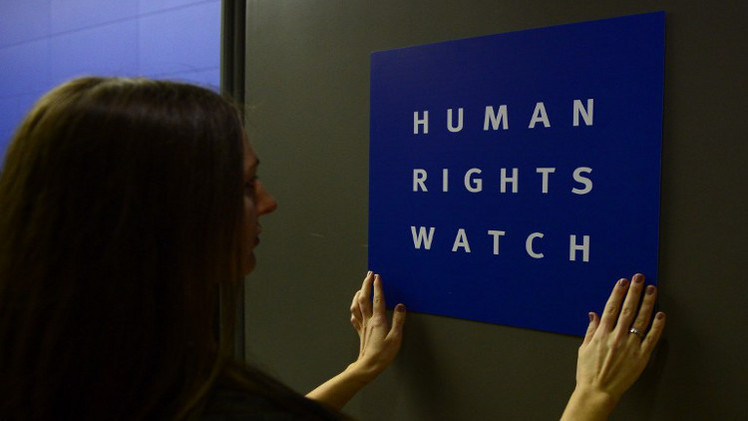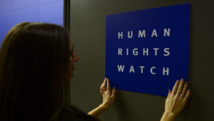the Jewish state accusing the group of being "fundamentally biased" against it. The New York-based watchdog, which has written critical reports about the Israeli occupation of Palestinian territories, applied months ago for a visa for its Israel and Palestine director, American citizen Omar Shakir.
On February 20, Israeli authorities informed it the request had been rejected because HRW is "not a real human rights group", the group said in a statement.
Israeli foreign ministry spokesman Emmanuel Nahshon confirmed the decision to AFP.
HRW, he said, had "demonstrated time and again it is a fundamentally biased and anti-Israeli organisation with a clear hostile agenda".
However, Nahshon said the ban on Shakir could be lifted. It "could be reconsidered if the organisation appeals against the decision to the interior ministry", he said.
Nahshon also said that HRW was not banned and its Israeli and Palestinian employees would still be permitted to work in Israel and issue reports.
"But why should we give working visas to people whose only purpose is to besmirch us and to attack us?" he asked.
Israel's government, seen as the most right-wing in the country's history, has been accused of putting pressure on both international and local rights organisations.
"We are genuinely shocked," Shakir said in response to the Israeli decision.
"We work in over 90 countries across the world. Many governments don't like our well-researched findings but their response is not to stifle the messenger," he told AFP.
A group of 17 NGOs on Friday released a joint statement of solidarity with Shakir and "our colleagues" in HRW.
"Neither closing Israel's borders to human rights organisations and activists nor other measures by the Israeli government against organisations that criticise the occupation will deter us from continuing to report human rights violations in the territories controlled by Israel," they said.
HRW last year published a report, "Occupation Inc", detailing how international and Israeli companies operating in Israeli settlements in the occupied West Bank were contributing to rights abuses.
"Settlement businesses unavoidably contribute to Israeli policies that dispossess and harshly discriminate against Palestinians, while profiting from Israel's theft of Palestinian land and other resources," HRW's Arvind Ganesan said at the time.
International law considers all settlements to be illegal and a major obstacle to peace as they are built on land the Palestinians see as part of their future state.
HRW has also staunchly campaigned for Israeli football clubs based in West Bank settlements to be expelled by the sport's governing body FIFA.
"We were shocked they (Israeli authorities) were not able to distinguish between genuine criticism and propaganda," Shakir said.
He admitted to having taken part in pro-Palestinian campaigns before joining HRW.
But according to Shakir, Israeli authorities told HRW the visa ban was not targeting him alone but would be applied to all foreign members of the organisation.
Nahshon said other organisations such as Amnesty International would be assessed on a case-by-case basis.
Last year, the Israeli parliament passed a controversial law compelling Israeli NGOs that receive most of their funding from foreign state entities to declare it in official reports.
The law did not specifically refer to left-wing organisations, but it is applicable to some 25 NGOs.
Right-wing NGOs, such as those supporting Israeli settlements, tend to rely on private donations, to which the law does not apply.
Roy Yellin from the anti-occupation Israeli NGO B'Tselem said they felt the government was trying to "scapegoat" them.
"It is part of a larger illiberal wave in recent years that is trying to portray critics as enemies of the state," he told AFP.
HRW, which has its headquarters in New York city's famed Empire State Building, has periodically fallen foul of governments across the globe.
"We have little relations with governments in North Korea, Sudan, Uzbekistan, Cuba and Venezuela where there is zero appetite for human rights engagement," Shakir said.
"With this decision, Israel is joining the list."
On February 20, Israeli authorities informed it the request had been rejected because HRW is "not a real human rights group", the group said in a statement.
Israeli foreign ministry spokesman Emmanuel Nahshon confirmed the decision to AFP.
HRW, he said, had "demonstrated time and again it is a fundamentally biased and anti-Israeli organisation with a clear hostile agenda".
However, Nahshon said the ban on Shakir could be lifted. It "could be reconsidered if the organisation appeals against the decision to the interior ministry", he said.
Nahshon also said that HRW was not banned and its Israeli and Palestinian employees would still be permitted to work in Israel and issue reports.
"But why should we give working visas to people whose only purpose is to besmirch us and to attack us?" he asked.
Israel's government, seen as the most right-wing in the country's history, has been accused of putting pressure on both international and local rights organisations.
"We are genuinely shocked," Shakir said in response to the Israeli decision.
"We work in over 90 countries across the world. Many governments don't like our well-researched findings but their response is not to stifle the messenger," he told AFP.
A group of 17 NGOs on Friday released a joint statement of solidarity with Shakir and "our colleagues" in HRW.
"Neither closing Israel's borders to human rights organisations and activists nor other measures by the Israeli government against organisations that criticise the occupation will deter us from continuing to report human rights violations in the territories controlled by Israel," they said.
- 'Zero appetite for rights' -
HRW last year published a report, "Occupation Inc", detailing how international and Israeli companies operating in Israeli settlements in the occupied West Bank were contributing to rights abuses.
"Settlement businesses unavoidably contribute to Israeli policies that dispossess and harshly discriminate against Palestinians, while profiting from Israel's theft of Palestinian land and other resources," HRW's Arvind Ganesan said at the time.
International law considers all settlements to be illegal and a major obstacle to peace as they are built on land the Palestinians see as part of their future state.
HRW has also staunchly campaigned for Israeli football clubs based in West Bank settlements to be expelled by the sport's governing body FIFA.
"We were shocked they (Israeli authorities) were not able to distinguish between genuine criticism and propaganda," Shakir said.
He admitted to having taken part in pro-Palestinian campaigns before joining HRW.
But according to Shakir, Israeli authorities told HRW the visa ban was not targeting him alone but would be applied to all foreign members of the organisation.
Nahshon said other organisations such as Amnesty International would be assessed on a case-by-case basis.
Last year, the Israeli parliament passed a controversial law compelling Israeli NGOs that receive most of their funding from foreign state entities to declare it in official reports.
The law did not specifically refer to left-wing organisations, but it is applicable to some 25 NGOs.
Right-wing NGOs, such as those supporting Israeli settlements, tend to rely on private donations, to which the law does not apply.
Roy Yellin from the anti-occupation Israeli NGO B'Tselem said they felt the government was trying to "scapegoat" them.
"It is part of a larger illiberal wave in recent years that is trying to portray critics as enemies of the state," he told AFP.
HRW, which has its headquarters in New York city's famed Empire State Building, has periodically fallen foul of governments across the globe.
"We have little relations with governments in North Korea, Sudan, Uzbekistan, Cuba and Venezuela where there is zero appetite for human rights engagement," Shakir said.
"With this decision, Israel is joining the list."









 Home
Home Politics
Politics











